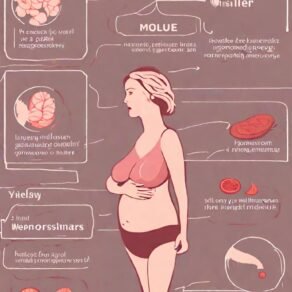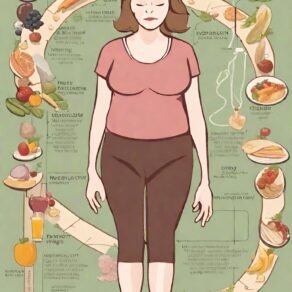Introduction: Menopause, a natural phase in a woman’s life, brings about numerous changes, both physical and emotional. One of the most frustrating changes for many women is the accumulation of belly fat. Often referred to as “menopause belly fat,” this phenomenon can be a source of distress and confusion.
Menopause triggers hormonal changes, particularly decreased estrogen levels, which can result in increased belly fat accumulation.
This hormonal shift tends to redistribute fat, particularly around the abdomen.
Visceral fat, located deep within the abdomen, poses health risks like heart disease and type 2 diabetes.
Causes of Menopause Belly Fat:
- Hormonal Changes: Estrogen plays a crucial role in regulating metabolism and fat distribution. As estrogen levels decline during menopause, fat tends to accumulate around the abdomen.
- Aging: Metabolism naturally slows down with age, making it easier to gain weight, especially around the midsection.
- Lifestyle Factors: Sedentary behavior, poor dietary choices, and stress can exacerbate weight gain during menopause.
Health Risks of midlife abdominal adiposity: Beyond cosmetic concerns, excess abdominal fat raises health risks, including:
- Cardiovascular disease
- Type 2 diabetes
- High blood pressure
- Stroke
- Certain cancers
Strategies to Combat midlife abdominal adiposity:
- Regular Exercise: Engage in a combination of aerobic exercises, such as walking or swimming, and strength training to boost metabolism and reduce abdominal fat.
- Healthy Diet: Focus on a balanced diet rich in fruits, vegetables, lean proteins, and whole grains while minimizing processed foods, sugar, and saturated fats.
- Stress Management: Practice relaxation techniques such as yoga, meditation, or deep breathing to reduce cortisol levels, which can contribute to belly fat.
- Hormone Replacement Therapy (HRT): Discuss with your healthcare provider the potential benefits and risks of hormone replacement therapy to alleviate menopausal symptoms and mitigate belly fat accumulation.
- Adequate Sleep: Prioritize quality sleep as insufficient sleep can disrupt hormonal balance and contribute to weight gain.
- Stay Hydrated: Drink plenty of water throughout the day to support metabolism and promote overall health.
Conclusion: midlife abdominal adiposity can be a frustrating aspect of the menopausal transition, but it’s not inevitable. By understanding the underlying causes and implementing healthy lifestyle habits, women can effectively manage and even reduce belly fat during this phase of life. Remember, achieving and maintaining a healthy weight is not just about aesthetics but also about safeguarding long-term health and well-being.





